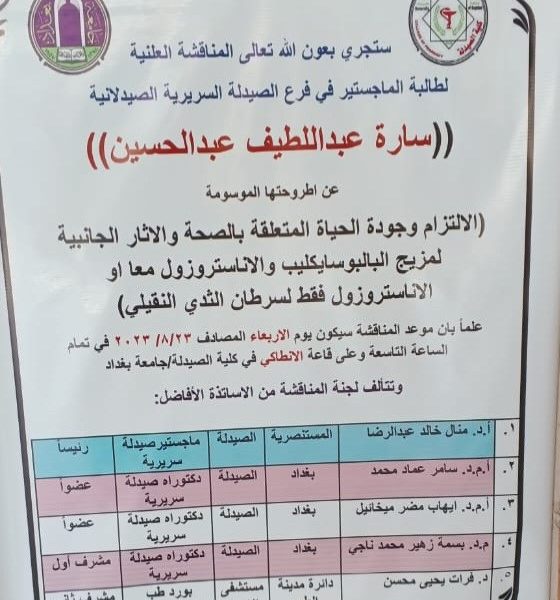The Faculty of Pharmacy discussed the Master’s Degree thesis, entitled Adherence, health-related quality of life, and adverse events of palbociclib/anastrozole combination or anastrozole monotherapy for metastatic breast cancer in Baghdad hospitals: a comparative study by Sarah Abdulatef Abdulhussein and the supervisor, Lecturer Dr. Basma Zuheir Muhammed Naji in the Clinical Pharmacy Department. The study aimed to compare the adherence and quality of life of the Palbociclib/anastrozole combination with that of anastrozole monotherapy among Iraqi women with breast cancer and to compare the adverse events of both drug regimens. This was a cross-sectional study conducted on female patients with metastatic breast cancer stage 4. Assessment of adherence was accomplished using the Arabic version of the Adherence to Refills and Medications (ARMS) questionnaire. In addition, patients’ quality of life was assessed using the Arabic version of the Questionnaire Functional Assessment of Cancer Therapy in Breast Cancer (FACT-B). The complete blood count test results were obtained from the patients’ medical records, whereas osteoporosis was assessed in the hospital using dual-energy X-ray absorptiometry (DEXA scan). The study recruited 120 patients with an age range of 56.78±5.06 years. The total adherence score of the study participants was 15.92±1.18, whereas the mean total score of the quality of life was 90.97±9.07. Women who were on anastrozole monotherapy had a significantly lower adherence score compared to those who were on the combination regimen. On the other hand, women on combination therapy had a significantly higher quality of life score. Women who received the combination regimen had a significantly higher incidence of three blood adverse reactions (neutropenia, thrombocytopenia, and anemia). The study concluded that women with breast cancer stage 4 had an acceptable level of adherence and a good level of quality of life.





